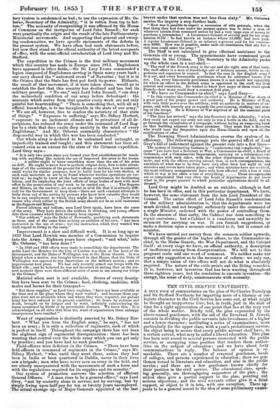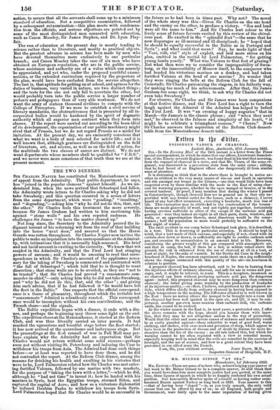THE CIVIL SERVICE UNIVERSITY.
A BLUE Boos of commentaries on the plan of Sir Charles Trevelyan and Sir Stafford Northcote for imparting more of a literary or col-
legiate character to the Civil Service has come out, at what might
be thought an inopportune time, but, in truth, just in the nick of time for a right appreciation of one point that lies at the very root of the whole matter. Briefly told, the plan expounded by the above-named gentlemen, with the aid of the Reverend B. Jowett, consists in dividing the public servants into two classes, of a higher and a lower character; instituting a series of examinations, more particplarly for the upper class, with a year's probationary service; the object being to secure that every public servant shall have, to a certain extent, what may be called a liberal education. This plan has been sent round to several persons connected with the public service, or occupying some position that renders them author- ities on the subject of education ; and we have about forty communications in reply. The balance of opinion is re- markable. There are a number of reverend gentleman, heads of colleges, and persons experienced in education; there are gen- tlemen versed in literature and education, and also in the public service ; and there are a few gentlemen known chiefly for their position in the civil service. The educational class, speak- ing generally, are thoroughgoing supporters of the plan ; the mixed class give a partial support to the plan, pointing out serious objections; and the civil servants either give it a fai4t support, or object to it in tote, with one exception. There pears to be a general assent to the idea of some preliminary exitutt- nation, to secure, that all the servants shall come up to a minimum standard of education. But a competitive examination, followed by a subsequent reexamination—this plan meets with condemna- tion from the officials, and serious objections are pointed out by some of the most distinguished men connected with education, such as Canon Moseley, Sir James Stephen, and Dr. Lyon Play- fair.
. The run of education at the present day is mostly tending to science rather than to literature, and mostly to practical objects. But the greatest advance in science has been made by men who have devoted themselves more exclusively to one particular branch; and Canon Moseley takes the case of six men who have obtained an European reputation, who are in the public service, whose assistance and authority are of a value which can scarcely be appreciated, and yet who, under the proposed youthful exami- nations, or the extended curriculum required by the projectors of the plan, would have been excluded from the service altogether. The fact is, that aptitude for getting on at school, and aptness for the duties of business, very varied in nature, are two distinct things ; and the tests for the one not only fail to ascertain the other, but would probably turn into the public service a larger number of pedants and pedagogues than of very able workmen. We do not want the army of sixteen thousand civilians to compete with the College of Preceptors. If we were to establish a civil service of literary mandarins, the obstructiveness that is presented by all in- corporated bodies would be hardened by the spirit of dogmatic authority which all superior men contract when they form into classes. If the report were carried out according to the beau-ideal of its development, the organization of our public machinery might rival that of Prussia, but we do not regard Prussia as a model for imitation. At the present day, we are eminently conscious that what we want is a body of men selected for active life; and it is well known that, although geniuses are distinguished on the field of literature, art, and science, as well as on the field of action, for the multitude the two classes of career are distinct. We do not .want departments whose members shall be qualified for " F.R.S."; and we never were more conscious of that truth than we are at the present moment.



































 Previous page
Previous page